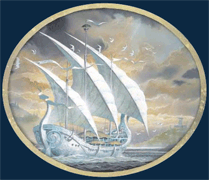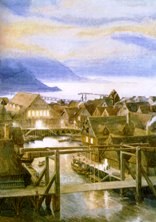Tolkien Calendar: The Hobbit
Showing Single Newsitem
September 22: TA 2941
21 September 2008 23:14:43Categories: Hobbit Calendar
They reach Lake-town just after sunset.
By the time that Bilbo and the "em-barralled" dwarves reach Laketown, we can also see the Professor foreshadowing his later writing style that we see in The Lord of the Rings. Look at this excerpt:
But men remembered little of all that, though some still sang old songs . . .
This is vintage Tolkien, isn't it? First is the great imaginary place, with a totally different kind of scape, like elves living in flets in trees. Second is the detailed geographical description, further enhancing the sense of place. Third is the description of trade patterns, adding an air of detail that helps us believe in the reality of the place. Fourth is the allusion to a great and glorious past, upon which the present is built, just like Laketown is built on the ruins of a greater city. And last, but not least, are the dim memories of that past which are present only in old songs. Although it seems to be accepted that The Hobbit is a children's book, here is one of the transition passages into a more adult style. And certainly the political corruption in Laketown is a more sophisticated theme.
P.S. Do you think Bilbo remembered that today was his birthday?
- "Not far from the mouth of the Forest River was the strange town he heard the elves speak of in the king's cellars. It was not built on the shore, though there were a few huts and buildings there, but right out on the surface of the lake, protected from the swirl of the entering river by a promontory of rock which formed a calm bay. A great bridge made of wood ran out to where on huge piles made of forest trees was built a busy wooden town, not a town of elves but of Men, who still dared to dwell here under the shadow of the distant dragon-mountain. They still throve on the trade that came up the great river from the South and was carted past the falls to their town; but in the great days of old, when Dale in the North was rich and prosperous, they had been wealthy and powerful, and there had been fleets of boats on the waters, and some were filled with gold and some with warriors in armour, and there had been wars and deeds which were now only a legend. The rotting piles of a greater town could still be seen along the shores when the waters sank in a drought."
But men remembered little of all that, though some still sang old songs . . .
This is vintage Tolkien, isn't it? First is the great imaginary place, with a totally different kind of scape, like elves living in flets in trees. Second is the detailed geographical description, further enhancing the sense of place. Third is the description of trade patterns, adding an air of detail that helps us believe in the reality of the place. Fourth is the allusion to a great and glorious past, upon which the present is built, just like Laketown is built on the ruins of a greater city. And last, but not least, are the dim memories of that past which are present only in old songs. Although it seems to be accepted that The Hobbit is a children's book, here is one of the transition passages into a more adult style. And certainly the political corruption in Laketown is a more sophisticated theme.
P.S. Do you think Bilbo remembered that today was his birthday?
© middle-earth-journeys.com. Images © Alan Lee.

